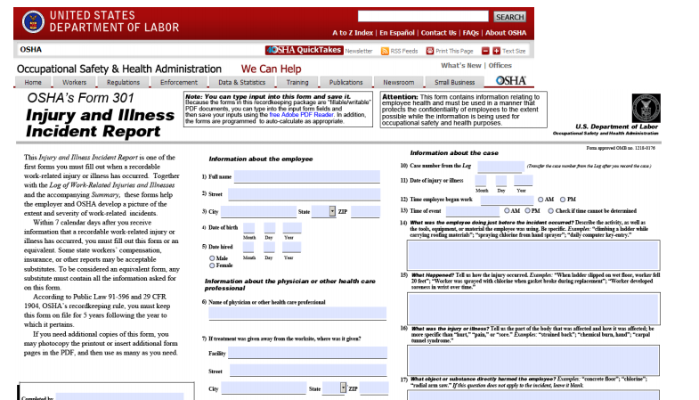
Rule Previously Became Effective on January 18, 2017
President Trump has signed into law House Joint Resolution 83, which repeals the “Volks Rule,” an Occupational Safety and Health Administration (OSHA) rule which imposed on employers continuing obligations to make and maintain accurate records of recordable injuries and illnesses. The rule previously became effective on January 18, 2017.
Overview
Late last year, the Department of Labor, along with the Occupational Health & Safety Administration, amended 29 CFR Part 1904, Clarification of Employer’s Continuing Obligation To Make and Maintain an Accurate Record of Each Recordable Injury and Illness, to include language that made it clear any injury after the initial 7 day reporting period would be a “continuing violation” beyond the 6 month penalty window.
Background
OSHA’s recordkeeping regulations require employers to record information about certain work-related injuries and illnesses on an OSHA 300 Log. Employers must enter each recordable injury or illness on the OSHA 300 Log, as well as on a supplementary OSHA 301 Incident Report, within 7 calendar days of receiving information that a recordable injury or illness has occurred. At the end of each calendar year, employers must create, certify, and post annual summaries of the cases listed on their 300 Logs for the prior calendar year. Generally, employers must retain their OSHA Logs, Incident Reports, and annual summaries for 5 years following the end of the calendar year that they cover.
If an employer initially fails to record a recordable injury or illness on the OSHA 300 Log or the corresponding OSHA 301 Incident Report, the employer still has an ongoing duty to record that case; as long as an employer fails to comply with the ongoing recording duty, there exists an ongoing violation of OSHA’s recordkeeping requirements. OSHA can cite employers for such recordkeeping violations for up to 6 months after the 5-year retention period expires.
Enter the Volks Rule: Using past related and unrelated case law, with long winded and elaborate justifications, the DOL and OSHA set out to convince themselves that the current laws for reporting injuries and maintaining records were not enough, and that any violation in the 5 year record-keeping window not reported would be treated as a continuing violation, opening up employers to further possible sanctions and fines.
‘Volks Rule’ Explained
OSHA’s “Volks Rule,” which became effective on January 18, 2017, amended OSHA’s recordkeeping regulations to state that:
- If an employer failed to record an injury or illness within 7 days, the obligation to record continued on past the 7th day, such that each successive day where the injury or illness remained unrecorded constituted a continuing “occurrence” of the ongoing violation.
- Under the rule, an employer could not avoid the five-year maintenance requirement by failing to make the record in the initial 7 days; rather, the obligation to make the record, for both the OSHA 300 Log as well as the OSHA 301 Incident Report, continued throughout the 5-year maintenance period even if the employer failed to meet its initial obligation.
Here is a summary from ConstructionDive on this controversial rule:
“The NAHB, along with other industry groups, has also filed suit against OSHA’s final recordkeeping rule. Industry organizations maintain that electronic filing requirements are burdensome and that the new public database of injury and illness information will expose confidential information. In addition, critics argue that the rule reveals only information about injuries and illnesses and nothing about safety efforts of companies.
However, the Department of Labor said that making injury and illness records public would let companies with good safety records showcase that to the public and would “nudge” other firms to step up their safety procedures.
A key component of the pushback to the rule is an anti-retaliation provision that would prevent employers from performing automatic, post-accident drug testing. OSHA’s position is that testing would prevent employees from reporting accidents and injuries, but many companies say it is a critical safety tool.
Implementation of this provision was held up briefly from August to December because of a court action in Texas led by the Associated Builders and Contractors, but a judge ultimately denied the request to block the rule, and it went into effect Dec. 1.”
‘Volks Rule’ Repealed
On April 3, 2017, President Trump signed into law House Joint Resolution 83 (H.J. Res. 83), which declares the “Volks Rule” to no longer have force or effect.
The National Association of Home Builders issued a statement in support of the joint resolution and called the Volks rule an “attempt to circumvent congressional authority.” The NAHB said the rule contradicted a 2012 U.S. Court of Appeals decision that said OSHA could not cite employers for recordkeeping violations past the six-month limitation.
Companies must still maintain logs of injuries and illnesses for the previous five years but now cannot be cited by OSHA for incidents beyond the six-month mark. The Associated Builders and Contractors praised Trump’s move Tuesday and said the now-eliminated rule “imposed a massive paperwork burden on contractors without improving job site safety.”
